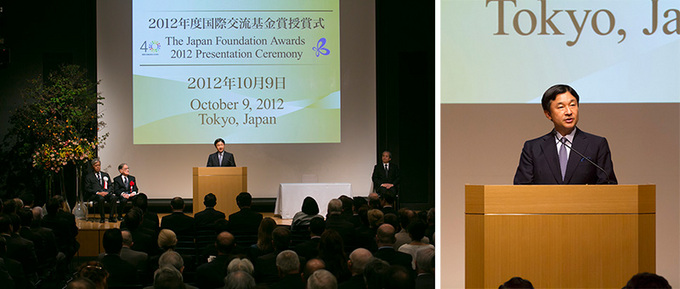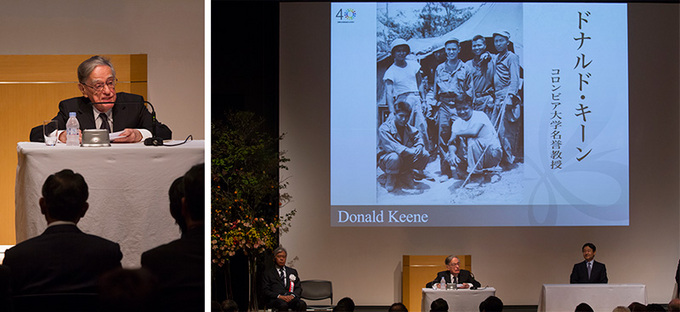Believing in the Power of Culture beyond the Regional and Historical Boundaries: Haruki Murakami's Acceptance Speech
The Japan Foundation Awards were established in 1973 to honor individuals or organizations for their contributions to the promotion of international mutual understanding and friendship through outstanding academic, artistic, or cultural activities. In the year of 2012, marking the Japan Foundation Awards' 40th anniversary, the selection committee chose to honor one organization and two individuals for their achievements: the Department of Japanese Language and Civilization of the National Institute of Oriental Languages and Civilizations (INALCO), which has produced many distinguished scholars in Japanese studies, teachers of Japanese language, diplomats, and Japanese interpreters, since it opened the first Japanese-language course in France in 1862; writer and translator Haruki Murakami, whose outstanding stories and descriptions offering new perspectives on the world have enchanted readers around the globe; and Irene Hirano Inouye, President of the U.S.-Japan Council, which has been bridging relations between the people of Japan and the U.S. for many years.
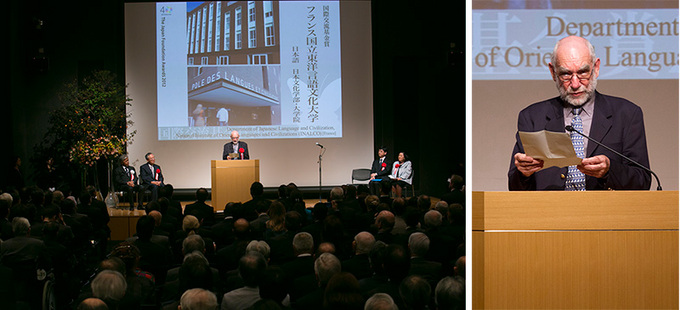
Professor François Macé gave an acceptance speech on behalf of INALCO's Department of Japanese Language and Civilization.
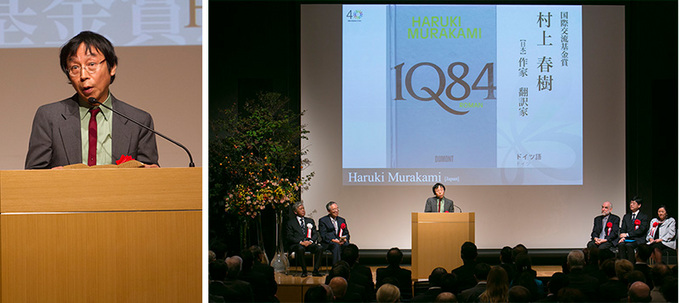
The recipients were introduced by close friends or colleagues. For the photos above, Professor Motoyuki Shibata of the Graduate School of Humanities and Sociology at the University of Tokyo touched upon the achievement of writer and translator Haruki Murakami, as his close friend and co-author of Honyaku Yawa.
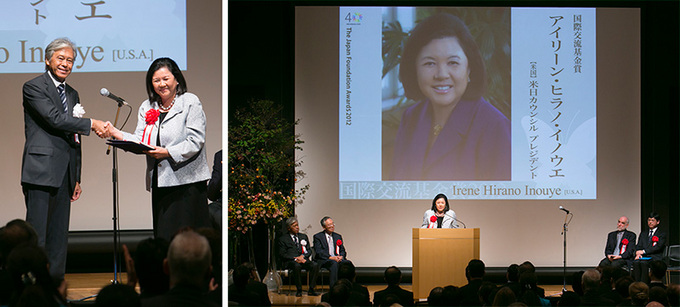
Irene Hirano Inouye, President of the U.S.-Japan Council, received the award from Hiroyasu Ando, President of the Japan Foundation. Her husband and U.S. senator Daniel Inouye, U.S. Ambassador to Japan John Roos and his wife also attended the ceremony to celebrate her award.
The award ceremony was held on Tuesday, October 9, 2012, in the presence of His Imperial Highness the Crown Prince of Japan. His Highness gave a speech describing how the Japan Foundation Awards have been presented to many people in various countries over these 40 years and how he looked forward to the continued success of the individuals and organizations who have received this award in their respective fields. He also mentioned his belief that individual exchanges develop into mutual understanding between countries, and expressed his anticipation for the further development of cultural exchange.
Since the year 2012 also marked the 40th anniversary of the establishment of the Japan Foundation, Donald Keene, Professor Emeritus of Columbia University and a recipient of the 1983 Japan Foundation Awards, gave a congratulatory speech to the 2012 recipients. He also talked about his long-time relationship with Japan, and how he reached the decision to acquire Japanese citizenship, commenting that at the age of 90, one of the things he now longs for is to spend his final days in Japan.
Photos: Atsuko Takagi
From the recipients' speeches, Wochi Kochi presents here the address given by Haruki Murakami, the author who has been captivating readers all over the world with "truly fine stories" that "help people have good dreams" through his work and translations.
I debuted as a novelist at the age of thirty and have been writing fiction in a wide variety of forms ever since. A quarter century has gone by since my works began to be translated and published abroad. Whenever I go to foreign countries and find people reading my books, I feel both surprised and struck by a deep sense of gratitude. I myself have been a passionate translator of foreign literature over the years, and one of my greatest joys is to see my own works being accepted abroad in a kind of exchange for my translation work.
One function accomplished by the task of translation is to demonstrate the ability of culture to manifest its power beyond the borders of a specific area and a specific period of history. For example, when I read Kafka's The Castle as a boy, I became totally immersed in the world of that novel, and an early twentieth-century nameless Czech country town felt, above all, real to me.
The purpose of storytelling is to transport things from a reality that exists apart from the here-and-now reality and, by doing so, to recreate a realer, more vivid reality in the here-and-now. This principle remains unchanged in all countries in all ages, and precisely because of that, a good story can be translated and is worth translating. This is what I believe.
In this real world of ours, there exist geographical borders. I don't know whether or not I should add "unfortunately" to this statement, but in any case, these borders between nations do exist. At times, they give rise to friction and to political problems.
In the world of culture, too, there exist borders. But unlike geographical borders, these borders between cultures can be crossed quite easily by us if only we make up our minds to cross them. Though language and lifestyle may differ from one culture to the next, it is possible for us to share each other's stories across cultures on an absolutely equal footing.
I don't know if these cultural border crossings can eclipse our geographical borders. I am fully aware that there are many reasons to be less than optimistic on that score. But each of us has been granted the inherent right to dream, and it is also the significance of a truly fine story that it helps people to have good dreams. I want to go on having these dreams by both translating and being translated.
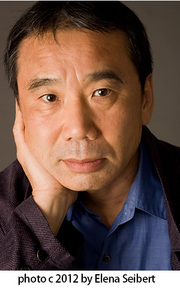 Haruki Murakami
Haruki Murakami
Born in Kyoto in 1949. Graduated from the Department of Literature, Waseda University. Debut with Hear the Wind Sing in 1979. Many of his works, including A Wild Sheep Chase, Norwegian Wood, The Wind-Up Bird Chronicle, Kafka on the Shore and 1Q84, as well as short stories, non-fiction books and essays, have been translated and published in about 45 languages. His outstanding stories and description to present new perspectives of the world have attracted young generations in the world enthusiastically, sparking the interest of foreign readers in Japanese language, literature and culture. He was presented with the Franz Kafka Prize, the Jerusalem Prize and the Catalonia International Prize, as well as the prizes in Japan. He has also translated a number of works, focusing on American literature.
The Japan Foundation and Haruki Murakami
Since 1989, the Japan Foundation has assisted in translating 22 of Haruki Murakami's works, including Dance Dance Dance, The Wind-Up Bird Chronicle, and A Wild Sheep Chase, into 15 languages including Spanish, Portuguese, and Hungarian.
It has also organized a reading session at the Japan Cultural Institute in Cologne, Germany in FY 2002, and a lecture in the Czech Republic in FY 2006, inviting Haruki Murakami himself to both events.
Other various reading sessions and symposiums about Haruki Murakami and his works have also been presented by the Japan Foundation, including "A Wild Haruki Chase: How the World Is Reading and Translating Murakami" (FY 2005).
Related Events
Keywords
- Literature
- The Japan Foundation Awards
- Japanese Studies
- Japanese-Language Education
- Japan
- United States
- France
- Czech Republic
- 1Q84
- National Institute of Oriental Languages and Civilizations
- Haruki Murakami
- U.S.-Japan Council
- Irene Hirano Inouye
- Motoyuki Shibata
- François Macé
- His Imperial Highness the Crown Prince of Japan
- Columbia University
- Donald Keene
Back Issues
- 2023.12. 7 Movie Theaters aroun…
- 2023.6.16 The 49th Japan Found…
- 2023.4.24 The 49th Japan Found…
- 2022.12.27 Living Together with…
- 2022.12.27 Living Together with…
- 2022.8.12 Inner Diversity <…
- 2022.3.31 The 48th Japan Found…
- 2022.3.29 Beyond Disasters - T…
- 2021.11.29 Crossing Borders, En…
- 2021.4.13 Crossing Borders, En…


